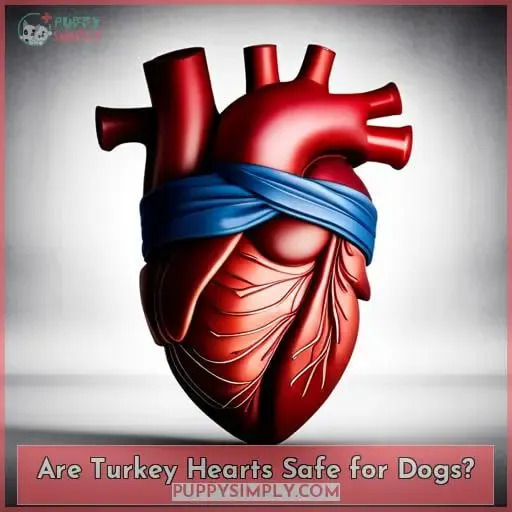This site is supported by our readers. We may earn a commission, at no cost to you, if you purchase through links.

While these nutrients make them a nutritious treat for dogs in moderation, there are also potential risks that come along with feeding them to your pet.
Table Of Contents
- Key Takeaways
- Can Dogs Eat Raw Turkey Heart?
- How to Safely Feed Turkey Hearts to Dogs
- Are Turkey Hearts Safe for Dogs?
- How to Feed Turkey Giblets to Your Dog
- Safely Feeding the Thanksgiving Turkey Neck to Your Dog
- Human Food That Dogs Can Eat
- Frequently Asked Questions (FAQs)
- How much turkey heart should I feed my dog?
- Are there nutritional benefits to feeding my dog turkey heart?
- What are some alternatives to feeding my dog turkey heart?
- What food safety precautions should I take when feeding my dog raw turkey heart?
- What breeds of dogs are most suitable for eating turkey heart?
- Conclusion
Key Takeaways
- Dogs can eat raw turkey heart, but it should be introduced slowly over 4-7 days.
- Turkey heart is a good source of protein, B vitamins, minerals, and taurine for dogs.
- Raw turkey heart should be cut into bite-sized pieces for safety and supervised while eating.
- It is important to adjust portion sizes as needed and consult a vet before making any changes to a dog’s diet.
Can Dogs Eat Raw Turkey Heart?
Organ meats, like turkey heart, can be a great addition to your pup’s diet. However, it is important to understand the potential benefits and concerns that come with feeding raw organ meats. Too much of this type of food could result in tummy troubles for your dog if not monitored properly.
Benefits of Raw Organ Meats
Organ meats like turkey heart are a nutrient-rich source of vitamins, minerals, and healthy fats, so you can give your pup the benefits they need for optimal health. Vitamin B12 is just one example that helps in red blood cell production, while protein from the muscle meat supports canine muscles.
Turkey heart also provides taurine, which helps with both eye and cardiovascular health.
When selecting organ meats as part of your dog’s diet, they should be sourced from reputable suppliers to ensure safety standards are met when consuming raw meat servings.
Concerns About Raw Organ Meats
Despite their nutritional benefits, it’s important to be aware of the potential risks associated with feeding your pup raw organ meats like turkey heart.
Digestive upset is a common concern when introducing new foods due to nutritional imbalances and vitamin deficiencies. Additionally, cooked foods may help reduce bacteria risk, such as salmonella, but can also result in lost nutritional value over time.
Other considerations involve potential choking hazards if large pieces are present, as well as allergies and intolerances some dogs may have towards certain ingredients found in hearts:
- Digestive upset risks from sudden changes in diet and nutrition imbalance
- Risks of feeding too much hearts causing toxicity
- Choking hazard on large chunks for small dogs
- Allergies and intolerances some pups might have
It’s essential that you always monitor signs of an adverse reaction whenever switching up your pet’s diet. Symptoms include vomiting, diarrhea, or lack of energy after eating meals containing heart meat products.
Ask your vet about reputable sources for sourcing quality organs before purchasing and consider other lean proteins that provide similar nutritional benefits without higher risk factors involved!
Tummy Troubles
It’s important to monitor any signs of an adverse reaction when introducing new foods like turkey heart, as sudden shifts in diet can cause digestive upset. Turkey hearts provide taurine and high protein for muscle health, vitamins and minerals to support the cardiovascular system, and essential fatty acids that are beneficial for brain and heart health.
When feeding raw turkey hearts, make sure you source them from reputable suppliers. Handle them properly with food safety measures such as washing hands before and after handling or refrigerating promptly after purchasing and defrosting safely.
Small dogs should have small pieces while puppies should introduce them slowly after weaning. Seniors need a go easy approach due to their rich nature, while overweight pets should pick leaner options without added fat content.
Feed responsibly: follow the 10% rule for commercial food and adjust based on other foods included in the diet.
How to Safely Feed Turkey Hearts to Dogs
Feeding your pup turkey hearts can be a nutritious addition to their diet, but it’s important to understand the safety considerations in order to make sure you’re doing so responsibly. Boiling, sautéing, and storing are all safe methods of preparing this organ meat.
Additionally, there are certain foods that should always be avoided when feeding turkey hearts — such as onions or garlic — so read labels carefully before purchasing any commercial products.
Boiling
Boiling turkey hearts is a great way to safely feed your pup – it reduces the risk of bacteria while preserving nutrition.
Here are some benefits of boiled turkey heart:
- Supports heart health with vitamin B6 and taurine
- Provides essential vitamins like A and B12 that benefit overall dog’s health
- Cooked easily in water or stock for added flavor without fat
- A nutrient-dense muscle meat with protein, iron, phosphorus, selenium & zinc.
It’s important to remember not all dogs will enjoy cooked food as much as raw, so you may need to adjust portions accordingly.
Saute
Sauteed turkey heart is a delicious way to give your pup an extra boost of nutrition.
Heat up some olive oil in a frying pan over medium heat, add the chopped hearts, and cook for 5-10 minutes until lightly browned on each side.
As with all raw meats, make sure you wash hands after handling and store cooked food safely when not feeding immediately.
Storing Turkey Hearts
Refrigerate turkey hearts promptly after purchasing and store them for up to 3 days, or freeze for longer-term storage.
Prepare individual hearts by lightly sautéing in oil over medium heat; five to ten minutes of cooking time is enough.
Make sure to wash hands with soap and warm water after handling raw meat diet ingredients like these!
Frozen turkey pieces can be used as an occasional treat instead of a regular meal component – thaw overnight before feeding your pup’s heart out.
Incorporate small bits into their existing meals if desired, but always monitor signs of intolerance when introducing new foods.
What to Avoid
Avoid giving your pup high-salt meats like ham, bacon, and rich gravies due to the potential for digestive upset. Pet parents should monitor their dog’s diet closely to prevent vitamin A toxicity from overfeeding.
Turkey heart is a great source of protein, promoting muscle health and providing essential fatty acids for eye health and brain development in puppies. Feeding turkey heart can help avoid taurine deficiency, as it contains this important nutrient that supports cardiovascular health.
Are Turkey Hearts Safe for Dogs?
If you’re wondering whether it is safe for your pup to eat turkey hearts, the answer is yes! But how much should they be eating? And can dogs eat raw turkey hearts? It’s important to understand all safety considerations when feeding this organ meat, as well as any potential risks or benefits.
Read on and learn more about incorporating turkey heart into your dog’s diet safely.
How Much Turkey Heart Should Dogs Eat?
Organ meats like turkey hearts should generally make up 10% or less of your pup’s diet to ensure they don’t consume too much fat and vitamins.
Turkey heart is a great source of essential protein, providing an energy boost without adding too many calories to their meal plan.
As if that wasn’t enough good news about this organ meat, it’s also loaded with minerals like iron and phosphorus for bone health plus selenium for the immune system.
For dogs who are following a raw food diet, turkey heart can be an essential part of their nutrient intake as well as provide some variety in flavor compared to other protein sources such as chicken or beef.
Be sure to speak with your vet before making any major changes in order to determine what works best for them so they get all the nutrition they need while keeping safe from potential risks associated with feeding organ meats.
Can Dogs Eat Raw Turkey Hearts?
You can safely feed your pup raw turkey hearts, as long as you ensure that they only make up a small portion of their overall diet and introduce it slowly. For example, one pet owner found success with giving her dog half a raw heart per day for the first week before gradually increasing the amount over time.
Raw turkey hearts are packed full of essential vitamins like B6 to help boost metabolism and brain functions, along with minerals such as iron, phosphorus, and selenium for bone health.
Furthermore, take care when handling any form of raw foods, including turkey necks, by washing hands after contact and storing them separately away from other foods in order to prevent digestive upset caused by bacteria growth.
Overall, feeding your canine companion some occasional treats made up of nature’s finest ingredients is an excellent way to provide them with all the nutrients they need while also keeping safety a top priority!
How to Feed Turkey Giblets to Your Dog
Gobble up nutrients for your pup by feeding them turkey giblets; they’re a great source of vitamins, minerals, and healthy fats! Turkey hearts are an excellent organ meat to incorporate into your dog’s diet.
They contain B vitamins such as thiamine, riboflavin, folate, and vitamin B6, as well as essential fatty acids like linoleic acid that help support cardiovascular health. Additionally, turkey hearts provide amino acids that help build muscle tissue and aid in recovery after exercise.
Incorporating this nutritious food into your pet’s diet is easy with these tips:
- Start small – introduce slowly over the course of 4-7 days to avoid causing digestive upset.
- Cut pieces bite-sized to reduce choking hazards.
- Source from reputable suppliers to ensure it’s safe for consumption.
- Balance intake with other organ meats – don’t feed too much at once.
- Use raw or cooked – either way provides nutritional benefits.
- Serve alongside lean proteins like chicken or beef.
- Monitor signs of intolerance – stop if diarrhea or vomiting occurs.
- Refrigerate promptly after purchasing.
- Wash hands before & after handling.
- Keep away from other foods when serving raw.
- Freeze for longer storage.
- Mix treats with regular meals.
- Don’t give cooked bones.
- Avoid rich gravy/drippings.
- Limit dairy.
- Don’t add onions/garlic.
- Skip high salt meats.
- Defrost properly.
- Store sealed.
- Supervise while eating.
- Follow the 10% rule.
- Adjust based on total daily intake.
- Avoid overeating.
- Transition gradually.
- Feed twice the weight of an average meal.
- Add low sodium broth.
- Chop chunks for smaller dogs.
- Check additives in commercial rolls.
- Ask vet for reputable sources.
- Avoid peppers & spices to prevent upset.
- Provide joint supplements for older pets.
- Go easy on rich organs for seniors.
- Moderate fat content if already high.
- Pick lean options for overweight dogs.
- Limit excess vitamin A to avoid toxicity risk.
- Ask vet about blood thinners.
- Balance bone ratio.
- Reduce protein for kidney issues.
- Make homemade snacks as treats.
- Add saved broth for added nutrition.
Turkey heart can be a fantastic addition to any dog’s dietary routine without worry—just use proper safety precautions when feeding it!
Safely Feeding the Thanksgiving Turkey Neck to Your Dog
Don’t let Fido miss out on the holiday fun – offer a special treat they’ll love with Thanksgiving turkey neck! It’s packed full of high-quality protein and nutrients, like Vitamin B6, iron, and essential fatty acids that’ll help keep your pup healthy.
Turkey neck can be served raw or cooked—just make sure you supervise while your dog is eating it to avoid any choking hazards from large chunks.
When preparing turkey necks for feeding time, always source them from reputable suppliers so you know what you’re getting is safe and free of contaminants. Wash hands before and after handling raw meat to prevent cross-contamination with other foods when serving raw.
If cooking instead, refrigerate promptly after purchase, then freeze for longer storage for safety purposes too! When ready, defrost overnight in the refrigerator before serving. Lightly cook by searing quickly if desired as a more tempting alternative over plain meat, but still take precautions against bacteria since this organ waste product isn’t designed specifically as pet food yet provides plenty of nutrition just like hearts do (but watch portion size that way!).
Lastly, don’t forget about those giblets – save these up too. Both are great additions to complete diets without worry, plus they provide even more vitamins and minerals than the heart alone does thanks to amino acid muscle-building power, helping recovery and exercise needs alike!
Human Food That Dogs Can Eat
You may be wondering what human food is safe for your pup to snack on. Well, there are a few varieties of fruits and vegetables that can make great treats for dogs, as well as meat and offal options like turkey heart, which provide essential protein and nutrients.
You should also consider the overall diet you’re providing with supplements or herbs and spices if needed.
Fruit & Veg
Making sure your pup is getting the right nutrients is like a beautiful garden – fruits and veggies should be part of their diet too! Feed your furry best friend chicken blood, hearts, gizzards, liver, or giblets to give them essential proteins.
Add variety with fresh produce like apples for fiber or blueberries for antioxidants. Offer carrots as an occasional treat since they contain sugar but no fat. Broccoli adds Vitamin C, while spinach provides iron – these leafy greens are especially beneficial to senior dogs who may need more support due to aging joints and decreased energy levels.
And don’t forget about pumpkin; it’s rich in vitamins A & E and helps promote healthy digestion! With so many delicious options available, you can create balanced meals that will keep tails wagging all day long!
Meat & Offal
Treat your pup to a special meal with turkey heart, a nutrient-dense muscle meat packed full of protein and essential vitamins and minerals. Serve raw or cooked, mix it into kibble, or use it in treats for an extra boost.
- High levels of taurine for healthy eyes & heart
- Iron, phosphorus & selenium
- B Vitamins like Thiamine & Vitamin B12
It’s the perfect balance between nutrition and flavor – plus it’ll keep them running all day! So give your best friend something delicious that will also be good for their health – turkey heart!
Diet & Recipes
You can add flavor and nutrients to your pup’s diet with a delicious turkey heart dish. Turkey hearts are nutrient-dense organ meats packed full of protein, vitamins, minerals, and essential fatty acids for brain and heart health.
| Benefit | Reason |
|---|---|
| Protein | Muscle Health |
| Vitamins | Source of B/C/A |
| Minerals | Iron/Phosphorus Selenium Magnesium Zinc |
| Taurine | Heart Health |
| Fatty Acids | Brain & Heart Health |
For small dogs, cut the turkey hearts into manageable pieces or freeze them overnight so they’ll last longer when chewing.
With all its nutritional benefits, it’s no wonder why your pup will love turkey hearts in their meals or as treats throughout the day.
Supplements
For an added boost, consider supplements to your pup’s turkey heart diet. Quality proteins, like those found in turkey hearts, can benefit from vitamin B6 supplementation for a healthy nervous system and cardiovascular health.
A raw diet offers natural sources of vitamins, minerals, and essential fatty acids, but it may need additional support if you are feeding large amounts or introducing new foods slowly. Supplementing with small doses of quality products can help ensure optimal nutrition without overfeeding the wrong nutrients.
Be sure to consult your vet before making changes, as some ingredients may not be ideal for specific breeds or age groups.
Herbs & Spices
Adding herbs and spices to your pup’s turkey heart dish can give them a tasty boost of flavor that will have their tail wagging. Turkey hearts are high in iron, so adding vitamin B6-rich spices like turmeric, ginger, or dill can help the body absorb this important mineral.
Quality fats from fatty acids found in olive oil also contribute to healthy skin – just add a dash for added nutrition! Spices like black pepper and garlic powder provide antioxidants while enhancing the taste of meals too!
So don’t forget – adding some extra flavor is an easy way to take your pup’s meal up a notch!
Frequently Asked Questions (FAQs)
How much turkey heart should I feed my dog?
Feeding your pup turkey heart is an excellent source of protein, vitamins, and minerals. Still, it’s important to limit the amount you give them – no more than 10% of their overall diet – as too much can lead to vitamin A toxicity or other issues.
Are there nutritional benefits to feeding my dog turkey heart?
Yes! Turkey heart is packed with protein, vitamins, and minerals that help support your pup’s muscle health, cardiovascular system, and eye health. It also provides beneficial fatty acids for brain and heart function. Feed in moderation to ensure the best nutrition without any potential risks.
What are some alternatives to feeding my dog turkey heart?
Alternatives to feeding your dog turkey heart include lean meats such as chicken and beef, fish like salmon and sardines, protein-rich eggs, joint supplements for older dogs, and other organ meats like liver and kidney.
What food safety precautions should I take when feeding my dog raw turkey heart?
Take food safety seriously when feeding your pup raw turkey heart. Always wash hands before and after handling, refrigerate promptly upon purchase, and cut the pieces into bite-sized chunks for maximum protection – it’s a must! Freeze for longer storage if needed to ensure you’re providing the safest meals possible for your furry friend.
What breeds of dogs are most suitable for eating turkey heart?
Smaller breeds of dogs are ideal for eating turkey heart. It’s nutrient-dense and packed with protein, but the pieces should be cut small to prevent choking hazards. Active canines benefit most from its high protein content, while seniors will appreciate its joint-strengthening benefits.
Conclusion
Feeding your dog turkey heart can be a great way to give them a nutritious and delicious treat. It’s a nutrient-dense muscle meat that provides high protein, iron, phosphorus, thiamine, vitamin B12, and taurine for heart and eye health.
Additionally, it’s a good source of zinc, copper, and selenium. However, it’s important to be aware of potential risks such as vitamin A toxicity, salmonella, and gout from the high purine content.
To ensure food safety, it’s crucial to store and handle the meat properly. With some careful preparation and moderation, raw turkey heart can be a healthy and enjoyable addition to your pup’s diet.











